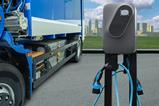Volvo Group President and CEO, Martin Lundstedt, has expressed his concern over the Euro VII proposal, stating it will slow down the transition to zero-emission transport and climate neutrality. Lundstedt believes the current proposal neglects the shift to zero-emission vehicles and disregards the impact of future CO₂ targets for heavy-duty vehicles. According to the manufacturer, recent studies have shown the Euro VII will only provide marginal benefits to air quality, given the rapid decarbonisation of the industry.

“There is no silver bullet that can decarbonise the transport indsutry. So we need to ensure that our R&D and investment focuses on making the greatest impact. Euro VII will slow this down” said Martin Lundstedt, the President and CEO of the Volvo Group and also current chariman of the CV board of vehicle makers association ACEA.
In its defence, The European Commission has cited low projected adoption rates for zero-emission trucks as the reason for the Euro Vll proposal, estimating that only 1 in 10 trucks will be zero-emission by 2030 and not even half of them will be battery or fuel-cell electric by 2040. However, the industry aims for higher standards, with the Volvo Group committed to achieving net-zero greenhouse gas emissions across its trucks, buses, construction equipment, and marine solutions by 2040.
Euro Vll sets major roadblocks for manufacturers, and our partners in the supply chain, to continue with their rapid shift to zero emissions, says the announcement by Lundstedt. If the proposal were to be enforced, truck makers would be forced to move their resources from battery and fuel-cell electric vehicles to the internal combustion engine, which would not only slow down the transition to electromobility, but potentially set it into reverse.
’As both a leader of a global manufacturer of trucks and buses, and representing the EU commercial vehicle industry in my role as Chairman of ACEA (European Automobile Manufacturers’ Association (ACEA)), I am deeply worried.’ commented Martin Lundstedt
The CEO further emphasised the importance of a coherent policy framework to support the transition to zero-emissions, including the right charging and refueling infrastructure, supportive vehicle regulations, and a comprehensive carbon pricing mechanism. He noted that the transition to zero-emissions heavily relies on a holistic approach and cannot be viewed in isolation from CO₂ standards for heavy-duty vehicles.

































